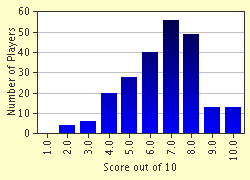Quiz Answer Key and Fun Facts
1. Some words that enter the English language diverge in meaning from the same words in the native tongue. You are touring Italy and desire an outside table. You inform your waiter that you wish to dine "alfresco". Based on the Italian colloquial meaning of "alfresco", where might the waiter think you desire your repast?
2. Sometimes words from two different languages enter English separately and end up as homonyms. "Gatlopp" was a Swedish term for an ordeal in which a person was forced to run between two lines of men while being beaten. A borrowed French word has ended up with the same English spelling and pronunciation as the English word derived from "gatlopp". What is the English meaning of the homonym derived from the French word? (Hint: the French homonym is an item that can be "thrown down".)
3. A Dutch word with a bit of "bite" to it, "pappekak", became the rather tame English "poppycock" used to indicate nonsense. The Dutch meaning of "pappekak" has much more in common with more cutting English expressions that are used to object to flagrant hogwash. Which of the following gives the best sense of "pappekak"? (Hint: Carefully consider the last three letters of the word. Add an "a" to them if needed).
4. I was surprised to find that some references indicate a Scottish origin for the word "croon". It didn't seem plausible that the early Scots would have a separate term for soft, sentimental singing. Further research disclosed that "croon" is a homonym for a Scottish word with a different meaning. What would one be doing if one were "crooning" in the Scottish sense of the word?
5. The pajamas we wear were named after loose fitting garments worn in India. However, the original word, said to be derived from the Hindu, did not refer to both the trousers and the shirt. To which part of our pajamas did the original term refer?
6. Adopted words do not necessarily look like they came from the language from which they originated; for instance, "chowder" is from French. By the way, does the French term from which chowder originated designate the pot or the soup it contains?
7. Yiddish is a particularly rich source of interesting words. The schlemiel is said to always spill his tea on which category of person?
8. There is a word of probable Etruscan origin that refers to a bogus sham or a specious counterfeit. This word derived from an intermediate Latin word meaning illegitimate. Which of the following is it? (Hint: I might just be horsing around a bit with this question.)
9. Some words become widely used in English only to drop out of use in their native tongue. Which of the following French words are linguistic refugees, i.e. no longer in use in France?
10. Hasenpfeffer is a variety of German stew. It probably doesn't surprise you that the "Pfeffer" is from the Old High German "pfeffar" meaning "pepper". The Old High German "haso" designates the type of meat the stew contains. From what animal does the meat come?
Source: Author
uglybird
This quiz was reviewed by FunTrivia editor
agony before going online.
Any errors found in FunTrivia content are routinely corrected through our feedback system.

